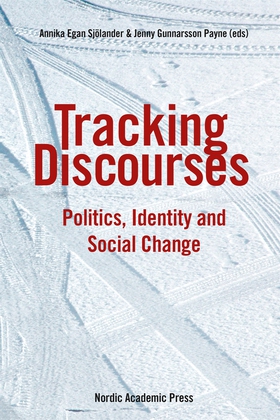
Lägg till önskelistan
Tracking Discourses: Politics, Identity and Social Change e-bok
Pris
149 kr
»Tracking Discourses is a useful collection for those new to CDA and DT approaches as it gives a detailed overview and examples throughout the study contributions. Additionally, for those already familiar with the theoretical approaches, this collection highlights the work being done in Scandinavia for the English-speaking world. True to its purpose, the book acts as a space for dialogue between CDA and DT and brings their use in the Swedish context to a wider audience.«Discourse & Societ...
E-Bok
149 kr
Pris
Förlag
Nordic Academic Press
Utgiven
27 Februari 2015
Genrer
Samhälle Och Politik, Fackböcker
Språk
English
Format
epub
Kopieringsskydd
Vattenmärkt
ISBN
9789187121210
»Tracking Discourses is a useful collection for those new to CDA and DT approaches as it gives a detailed overview and examples throughout the study contributions. Additionally, for those already familiar with the theoretical approaches, this collection highlights the work being done in Scandinavia for the English-speaking world. True to its purpose, the book acts as a space for dialogue between CDA and DT and brings their use in the Swedish context to a wider audience.«Discourse & Society
»The book offers a good chance to keep readers informed of how DT and CDA have been received and developed in Swedish academia Case studies in the volume are really inspiring the very first step is of great significance and I look forward to the furtherance of the dialogue in the near future.« Discourse Studies, University of Wellington Discourse
Theory (DT) and Critical Discourse Analysis (CDA) are theoretical traditions that have gained intense research interest in recent decades. Both are concerned with critical studies of politics, identity, and social change with a focus on issues of power and language, yet the dialogue between DT and CDA scholars has been negligible until only recently.
In Tracking Discourses Politics, Identity and Social Change, twelve researchers explore the opportunities presented by an increased exchange of ideas between the two traditions. The authors examine what closer collaboration could offer, both theoretically and empirically, in an interdisciplinary context. The Scandinavian reception, development, and use of DT and CDA are presented for the first time in a concise way.
The studies in Tracking Discourses are of pivotal interest to the practical application of theoretical concepts and the empirical analysis of specific discourses based on one or both of the analytical perspectives. The case studies presented are valuable sources for comparison with similar research undertaken in other countries and contexts.




